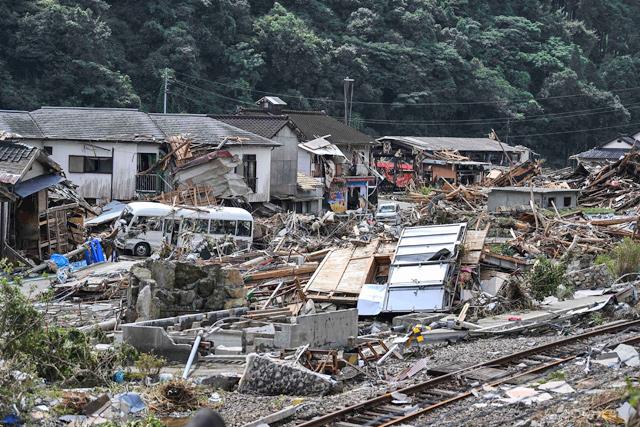- International News
- Thu-2020-07-09 | 04:17 pm

Rains that began early Saturday on the island of Kyushu have already inflicted widespread damage across a swathe of the southwestern portion of the country, causing rivers to burst their banks and hillsides to collapse.
As the weather front moved north, the Japan Meteorological Agency (JMA) warned of heavy rain in central Gifu and Nagano prefectures, but downgraded its advisories from their top level. Evacuation orders were lifted for hundreds of thousands of people.
Nevertheless, a JMA official warned of "an unprecedented level" of rain for parts of central Japan.
"Especially in areas designated as high risk for landslides and flooding, the possibility is extremely high that some kind of disaster is already happening," he added.
At least 80,000 rescue workers have already been deployed to reach survivors stranded by flooding and landslides, with another 10,000 troops set to join them.
The toll in the disaster has risen steadily as the rescue operation continues.
An official of the hardest-hit Kumamoto region told AFP that there had been 55 deaths and "four people are in cardio-respiratory arrest” — the term used before confirming death.
There were also two deaths in Omuta city, also in Kyushu.
More than a dozen people are still missing and authorities are investigating whether six other deaths are linked to the disaster.
In hardest-hit Kyushu, the rains had mostly stopped by Wednesday morning, leaving residents to pick up the pieces.
Keisuke Masuda, a 67-year-old resident of Hitoyoshi city told the Jiji news agency he had watched in horror as a tide of water from the swollen Kuma river carried away a neighbour.
"He was swept away right before my eyes,” Masuda said.
The elderly man had been clinging to a bush trying to withstand the flood water but eventually could hold on no longer, Masuda said, describing his neighbour waving to his wife as he was washed away.
"I was overcome with a sense of helplessness,” Masuda added.
Elsewhere in the city, Naomi Nishimura told Japan’s NNN broadcaster that her parents died after refusing to leave their home.
"Even though a neighbour came over and pleaded with my parents to evacuate, they didn’t go... because I had told them that I’d come home [that day],” the tearful woman said as she attempted to clean her parents’ flood-devastated home.
Non-mandatory evacuation orders were lifted in many places, though nearly 900,000 people were still under the warnings












